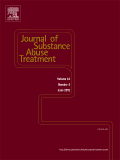
JOURNAL OF SUBSTANCE ABUSE TREATMENT
Scope & Guideline
Advancing Knowledge, Enhancing Lives
Introduction
Aims and Scopes
- Evidence-Based Treatment Practices:
The journal focuses on the dissemination of research related to evidence-based practices for treating substance use disorders, including pharmacotherapy and psychosocial interventions. - Cultural Competence and Diversity:
There is a strong emphasis on understanding and addressing the unique treatment needs of diverse populations, including racial/ethnic minorities, LGBTQ individuals, and those involved in the criminal justice system. - Integration of Mental and Substance Use Health:
The journal explores the intersection of mental health and substance use disorders, promoting integrated treatment approaches that account for co-occurring conditions. - Innovative Treatment Modalities:
Research published in the journal often highlights novel treatment approaches, including digital health interventions, peer support models, and community-based strategies. - Policy and System-Level Interventions:
The journal addresses the broader systemic and policy-level factors that affect treatment access and availability, particularly in the context of public health crises such as the opioid epidemic. - Quality of Care and Treatment Outcomes:
Studies on treatment retention, patient experiences, and long-term outcomes are central to the journal's mission to improve the quality of care provided to individuals with substance use disorders.
Trending and Emerging
- Telehealth and Digital Interventions:
The rapid adoption of telehealth and digital technologies in substance use treatment, especially during the COVID-19 pandemic, has led to an increase in studies examining their effectiveness and implementation. - Polysubstance Use Research:
There is a noticeable uptick in research addressing polysubstance use, reflecting the complexity of substance use disorders and the need for integrated treatment approaches. - Community and Peer Support Models:
Emerging themes around community-based interventions and peer support systems are gaining traction, highlighting the importance of social networks and community involvement in recovery. - Crisis Response and Adaptation to COVID-19:
Research focused on the adaptations made in substance use treatment in response to the COVID-19 pandemic has become increasingly relevant, showcasing resilience and innovation in the field. - Equity and Access to Treatment:
There is a growing emphasis on addressing disparities in access to treatment for marginalized populations, including racial/ethnic minorities and individuals experiencing homelessness, indicating a shift towards health equity in substance use treatment.
Declining or Waning
- Traditional Substance Use Treatment Models:
There appears to be a diminishing focus on traditional, one-size-fits-all treatment models, as newer, more individualized approaches gain traction in the literature. - Focus on Alcohol Use Disorder Alone:
Research specifically targeting alcohol use disorder, without considering polysubstance use or co-occurring disorders, has become less frequent, reflecting a broader understanding of substance use as a multifaceted issue. - In-Person Treatment Modalities:
The decline in publications centered on in-person treatment modalities, particularly due to the COVID-19 pandemic, indicates a shift towards telehealth and digital interventions. - Stigmatization of Substance Users:
Although still relevant, the focus on stigma as a primary barrier to treatment has waned in favor of more practical strategies for improving treatment access and integration. - Single Substance Focus Research:
Research exploring the effects of single substances without considering the context of polysubstance use or broader social determinants has decreased, reflecting a growing recognition of the complexity of substance use disorders.
Similar Journals

Journal of Dual Diagnosis
Exploring the complexities of dual diagnosis.The Journal of Dual Diagnosis, published by Routledge Journals, Taylor & Francis Ltd, is a leading interdisciplinary platform dedicated to the critical study of co-occurring mental health and substance use disorders. With its ISSN 1550-4263 and E-ISSN 1550-4271, this esteemed journal has been at the forefront of advancing research and clinical practice since its inception in 2004, and continues to serve as a vital resource until 2024. Ranked in the second quartile (Q2) in Psychiatry and Mental Health and positioned at the 64th percentile in the Scopus rankings, it emphasizes the importance of integrating care across various domains of health. Although not open access, it offers a wealth of peer-reviewed articles, case studies, and reviews suitable for researchers, practitioners, and students alike, aiming to enhance our understanding and treatment of dual diagnosis. The journal's commitment to addressing the complexities of dual disorders not only informs research but also shapes policy and clinical guidelines, making it an essential read for anyone involved in these critical areas of mental health.

Substance Abuse Treatment Prevention and Policy
Connecting research and policy for a healthier tomorrow.Substance Abuse Treatment, Prevention, and Policy is a premier open access journal published by BMC, dedicated to advancing the understanding and improvement of substance abuse treatment and prevention strategies. Since its inception in 2006, this journal has established itself as a significant resource in the fields of Health Policy and Psychiatry and Mental Health, proudly maintaining a strong reputation reflected in its 2023 Scopus rankings, which place it in the top quartiles of these categories. With an impactful focus on policy implications and evidence-based practices, the journal's comprehensive coverage supports the sharing of innovative research and perspectives aimed at mitigating substance abuse challenges worldwide. Open access since its launch, it ensures that vital research is readily available to researchers, practitioners, and students alike, facilitating collaboration and discourse in this critical area of public health. Its commitment to high-quality research is underscored by its rankings within the 78th percentile for Health Policy and 66th percentile for Psychiatry and Mental Health, highlighting its influence and relevance in addressing pressing issues in substance misuse.
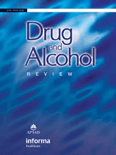
DRUG AND ALCOHOL REVIEW
Bridging disciplines to tackle addiction challenges.DRUG AND ALCOHOL REVIEW, published by Wiley, is a leading journal dedicated to advancing the scholarship in the fields of drug and alcohol research. Since its inception in 1989, this esteemed publication has provided a critical platform for the dissemination of innovative research findings, reviews, and theoretical papers, addressing pressing issues in substance use and addiction. With an impact factor that places it in the Q1 category in both Health (social science) and Medicine (miscellaneous), it ranks #78 out of 371 in the Scopus index for Health and #115 out of 398 in Medicine, reflecting its significant influence and high citation rates among scholars. The journal is committed to fostering a multidisciplinary approach, integrating perspectives from psychology, sociology, public health, and medicine, to inform policy and practice. Accessible to researchers and practitioners alike, *DRUG AND ALCOHOL REVIEW* serves as an essential resource for anyone invested in understanding and addressing the complexities of drug and alcohol use in society.
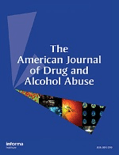
AMERICAN JOURNAL OF DRUG AND ALCOHOL ABUSE
Advancing the Understanding of Substance Use and AddictionAmerican Journal of Drug and Alcohol Abuse is a highly regarded publication in the field of substance abuse research, published by Taylor & Francis Inc. With its inception in 1974, this journal has become an essential resource for scholars and practitioners interested in clinical psychology, psychiatry, and the multifaceted issues surrounding drug and alcohol use. It holds a notable Q2 ranking in Clinical Psychology, Medicine (miscellaneous), and Psychiatry and Mental Health, emphasizing its impact and relevance in these domains. The journal's 2023 Scopus rankings further highlight its standing, placing it in the top quartile of publications with established readership and citation metrics. Researchers and students can benefit from its comprehensive articles that delve into the complexities of substance use, treatment methodologies, and the socio-psychological underpinnings of addiction. Whether you seek to access cutting-edge studies or contribute to ongoing discourse in the field, the American Journal of Drug and Alcohol Abuse serves as a vital hub for knowledge dissemination and scholarly engagement.

Harm Reduction Journal
Exploring the forefront of addiction research and policy.Welcome to the Harm Reduction Journal, a premier academic platform published by BMC, dedicated to advancing the field of harm reduction since its inception in 2004. With an impressive track record as an Open Access publication, this journal addresses critical topics within the broad scope of medicine, psychiatry, and public health, making it indispensable for researchers, healthcare professionals, and students alike. As of 2023, it proudly holds a Q1 ranking in prestigious categories including Medicine (Miscellaneous), Psychiatry and Mental Health, and Public Health, Environmental and Occupational Health, reflecting its high impact and significance in the academic community. The journal is notable for its comprehensive discussions on innovative harm reduction strategies, public policy considerations, and evidence-based practice, fostering collaboration and knowledge exchange. With a global reach and commitment to enhancing health outcomes, the Harm Reduction Journal serves as a vital resource in the ever-evolving landscape of public health and addiction research.
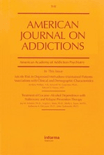
AMERICAN JOURNAL ON ADDICTIONS
Pioneering Research for Lasting Impact on Public HealthThe AMERICAN JOURNAL ON ADDICTIONS, published by WILEY, stands as a premier publication within the realms of Clinical Psychology, Medicine, and Psychiatry. With its ISSN 1055-0496 and E-ISSN 1521-0391, the journal has been a critical resource since its inception in 1992, consistently evolving to encompass a wide scope of addiction research and its implications on public health. Renowned for its rigorous peer-reviewed articles, it boasts impressive rankings, including Q1 status in both Clinical Psychology and Medicine (miscellaneous) for 2023, and a respectable Q2 in Psychiatry and Mental Health. As a foundational platform for disseminating cutting-edge research, the journal aims to facilitate the exchange of knowledge among researchers, healthcare professionals, and educators alike. Its significant impact on the academic community is underscored by its Scopus rankings—placing it in the top 26% of Clinical Psychology journals and the top 28% in Medicine (miscellaneous). By fostering an understanding of addiction and its treatments, the AMERICAN JOURNAL ON ADDICTIONS plays an essential role in guiding innovative practices and shaping future policies within the field.

Addicta-The Turkish Journal on Addictions
Connecting research and practice to combat addiction challenges.Addicta - The Turkish Journal on Addictions, published by the esteemed Turkish Green Crescent Society, is an open access journal dedicated to advancing the understanding of addictions and their implications on mental health. Since its inception in 2019, this journal has become a significant platform for interdisciplinary research, focusing on the biological, psychological, and sociocultural aspects of addiction. With a focus on both empirical studies and theoretical discussions, Addicta seeks to foster a greater understanding of addiction as a complex phenomenon, facilitating knowledge sharing among researchers, practitioners, and policymakers. The journal has achieved notable rankings, residing in the Q4 category in Biological Psychiatry and Psychiatry and Mental Health, and Q3 in miscellaneous Psychology, marking its growing impact in the field. Accessing its content is completely free, making important research accessible to a broader audience. Based in Turkey, Addicta provides a vital resource for those interested in the nuances of addiction research, promoting innovative solutions and fostering collaboration across disciplines.
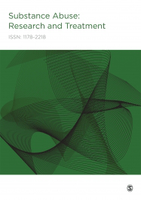
Substance Abuse-Research and Treatment
Innovating treatment approaches for substance-related disorders.Substance Abuse: Research and Treatment is a premier open-access journal published by SAGE Publications Ltd, focusing on the multifaceted aspects of substance use and its impact on mental health. Since its establishment in 2008, this journal has been dedicated to disseminating innovative research findings, case studies, and reviews that enhance understanding and treatment of substance-related disorders. With an impact factor that reflects its standing in the field, currently ranked in the Q2 category of Psychiatry and Mental Health, Substance Abuse: Research and Treatment strives to foster interdisciplinary dialogue among researchers, practitioners, and students. By making its content freely accessible, the journal encourages widespread engagement and application of evidence-based practices to mitigate substance abuse issues. The journal’s diverse global perspectives make it a vital resource for anyone invested in advancing knowledge and improving treatment outcomes in this critical area of public health.
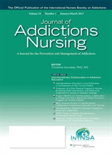
Journal of Addictions Nursing
Enhancing Patient Outcomes in Addictions NursingThe Journal of Addictions Nursing, published by Lippincott Williams & Wilkins, serves as a pivotal resource in the field of psychiatric and mental health nursing. With an ISSN of 1088-4602 and an E-ISSN of 1548-7148, this esteemed journal has been dedicated to advancing the knowledge and practice of addiction nursing since its inception in 1989. As of 2023, it ranks in the Q3 category of psychiatry and mental health, highlighting its significance amidst its peers. The journal provides a platform for the dissemination of original research, reviews, and clinical practices that address the complexities of addiction treatment and care. While it currently does not offer open access options, its valuable insights are accessible to practitioners and researchers committed to improving patient outcomes. With content spanning from 1989 to 2024, the journal continues to shape the discourse in this vital area of nursing, making it an essential read for professionals and scholars aiming to stay at the forefront of addiction nursing and intervention strategies.

Journal of Substance Use & Addiction Treatment
Innovating solutions for addiction recovery.Journal of Substance Use & Addiction Treatment is a premier scholarly publication dedicated to advancing the understanding and treatment of substance use disorders and addictive behaviors. Published by Elsevier Science Inc, this journal serves as a vital platform for researchers, clinicians, and students in the fields of psychology, psychiatry, public health, and addiction studies. With its commitment to Open Access, the journal facilitates wide dissemination of cutting-edge research, enabling practitioners and policymakers to access critical findings that inform treatment approaches and public health strategies. As an essential resource in addiction treatment and research, the Journal of Substance Use & Addiction Treatment aims to foster interdisciplinary collaboration and innovation, ultimately improving outcomes for individuals affected by addiction.